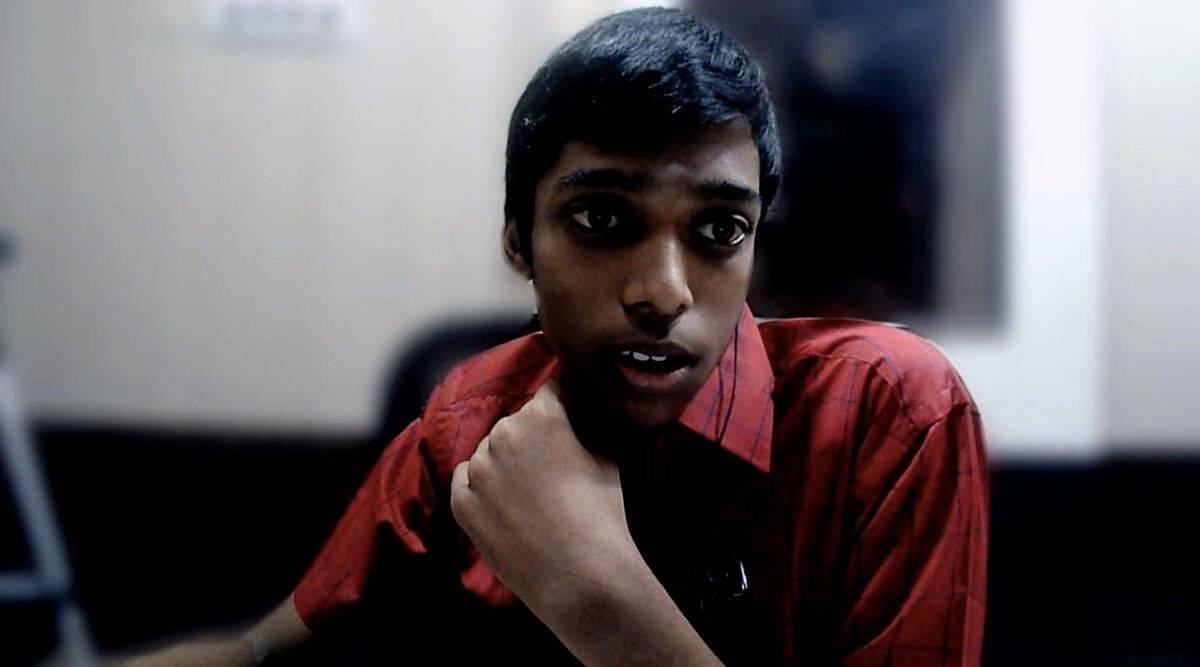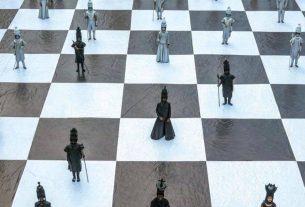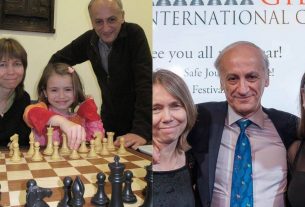The 16-year-old, whose dream run to the Chessable Masters final coincided with his board exams, was inadvertently benefited by not preparing for the tournament as much as he would for other competitions.
Thank you for reading this post, don't forget to subscribe!Shared News: May 28, 2022 7:26:59 am
Indian Grandmaster R Praggnanandhaa lost to Ding Liren in the final of the Meltwater Champions Chess Tour Chessable Masters tournament. (Screengrab)
When R Praggnanandhaa was invited for the Chessable Masters, he first checked his board exam schedule. The knockout phase of the tournament, featuring some of the strongest in the field, stretched to his exam days. But he was not worried and accepted the invitation. “I thought, well, I would not reach the knockouts, I would crash out in the group stages. And then focus on the exams,” he says.
But as it turned out, he ended up as a finalist, losing to World No 2 Ding Liren in a tense encounter, en route accounting for the scalps of Magnus Carlsen, who he had defeated twice in the space of three months. He thought he could balance academics (preparations for exams anyway begin 10 days before the exams, he admits) and chess seamlessly, but in the end, it became a sleepless grind. “Today, I finished my game at 2.40 am, didn’t get sleep till around 4 am, and then had to wake up at 7 am and rush for the exam. It was tougher than I had imagined. I thought I would study in the morning and play at night. But it turned out to be hectic,” he says, though his eyes barely betrayed any signs of fatigue, rather glowed in the satisfaction of beating some of the finest of all time.
As a consequence, he didn’t prepare for the tournament as much as he would have for most other competitions. Even before the final against Liren, he only casually breezed through some of his opponent’s moves. Inadvertently, it benefited him. “He was relying on tactical strength and not preparation, his decision-making and analytical skills. He was thinking on the board and was trusting the hard work he had put on early. This, to me, is the biggest positive from the tournament, for, in the past, he has sometimes tended to over-prepare,” says his coach RB Ramesh.
Outwardly, he appears utterly calm. But in the break between tense games, as was the final, he drops out of his room and wildly swings his badminton racquet. That’s his pressure-coping mechanism. “During, the first five minutes of the 15-minute break, I quickly go through my moves, and then I pick the racquet and just practise a few shots but without a shuttle. It settles my nerves and helps me focus purely on the new game, especially If I had lost the previous one,” Praggnanandhaa says, chuckling.
Only a few days after the match does he analyse his games in detail, usually with his sister Vaishali, a GM herself, or Ramesh. He then rigorously irons out his flaws. Ramesh explains: “There are players who always play in their comfort zone. But he is not like that, he works a lot on areas that are uncomfortable for him. For instance, during this lockdown, he was working on his openings with the black. This hardworking nature sets him apart from a lot of other youngsters, who are talented but are not as hardworking as he is.”
The support system also helps. There is a Grandmaster at home. There is another talented young GM at Ramesh’s Academy, the 22-year-old Aravindh Chithambaram. There is Ramesh himself and Praggnanandhaa also fine-tunes himself under two coaches at Viswanathan Anand’s Academy. Thus, he has made the computer chess engine redundant. “I don’t like playing with computers because they come up with the most difficult moves, and nobody can beat them. I like playing against a human, over the board, or playing against myself. That’s so much more fun,” he says.
He likes the warmth of face-to-face, eye-to-eye cerebral combat. He gets to talk chess with some of the players and learn more. Anish Giri for instance. The last time he met him, the Dutchman pointed out a flaw in his game, which he has rectified and become stronger.
He was, during the initial days of the lockdown, not keen on playing online chess. He turned down several invitations before online chess became the way of the world and he too moved on. The reluctance hampered his points, “and not progress,” as Ramesh puts it. “He crossed the 2600 ELO mark when he was 14, must have been one of the youngest, but in the next two years, he managed only around 600. But he made good use of that time, learning new variations and studying new moves. As a player, he has made a lot of progress and he is reaping the rewards,” says Ramesh. The fruits of labour are sweet, Praggnanandhaa would have felt in the last fortnight.
He does, however, remain firmly grounded and puts things in perspective. “It’s just a one-off win. I have not achieved what those guys have. They have been performing at this level for ages. So I am happy with these results, that I can compete with them but it would take more hard work to match their standards,” he says. Ramesh chimes in: “The aim is to reproduce such results in the standard time format, not just the rapid format, year after year on a consistent basis.”
He has one more paper to wrap up the academic year, but many more tests, especially on the chessboard, await him.




